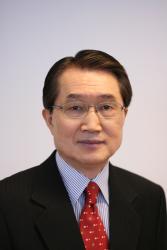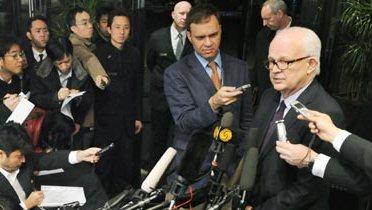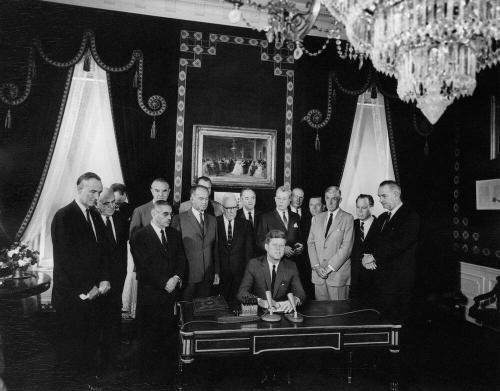For observers of the Six-Party Talks on North Korean denuclearization, developments in the past two months create a sense of déjà vu. Leaders in Seoul and Washington have recently made statements about the potential for resuming the Six-Party Talks—on North Korean denuclearization—that appear to be a prelude to a repetition of past patterns of failure. More recently, North Korea has dramatically increased pressure, firing artillery rounds into an inhabited island administered by South Korea.
Before this attack, momentum seemed to be building for a premature return to the Six-Party Talks. According to a New York Times report published on November 8, South Korea has quietly dropped its demand for an apology from the North for the sinking of the South’s naval warship Cheonan in March; previously Seoul had said that an apology would pave the way for resuming the Six-Party Talks. Three days later on November 11, President Barack Obama, at a press conference in Seoul with South Korean President Lee Myung-bak, said that North Korea must show “a seriousness of purpose” before the Talks could resume. He further said that his and President Lee’s “belief is that there will be an appropriate time and place to reenter into Six-Party Talks,” signaling to some that the Talks are likely to be held in a less distant future.
It seems obvious that the Seoul and Washington’s recent reactions to China’s persistent calls for the resumption of the Talks significantly water down the two preconditions set previously – the North’s apology for the Cheonan and implementation of the agreed disablement of Yongbyon nuclear facilities – for going ahead with the Talks. Meanwhile China has argued that the North has demonstrated a sincere attitude toward the Six-Party Talks, as Kim Kye-Gwan, North Korea’s chief negotiator, publicly confirmed a commitment to denuclearization after the meeting with his Chinese counterpart, Wu Dawei, in Beijing last October. To be precise, a declaration of sincerity is short of the seriousness of purpose that President Obama recently demanded. But President Obama remains hopeful, saying, “We will continue to look for signals from the North that they’re serious.” On November 23 in Tokyo, Ambassador Stephen Bosworth, the U.S. State Department’s special envoy for North Korea policy, sounded a more cautious note, saying “we are very concerned as to the sincerity of the DPRK’s approach to this.” The previous day, Ambassador Bosworth said, “We do not contemplate resuming negotiations while active programs are under way or while there is a possibility that North Koreans would test another nuclear device or test a missile.”
Seoul
and Washington must not lose focus
South Korea and the United States have reportedly been working for months to develop new strategies toward North Korea and one result of the process is a creeping ambivalence. Pyongyang’s consistent refusal to make concessions seems to be wearing the two governments down, and their preconditions for resuming the Six-Party Talks may be compromised and may even slip away. Due to fatigue, exasperation, and political and bureaucratic momentum, the Talks may resume before the two governments can even resolve the question of whether the Talks should resume (though the recent artillery attack will almost certainly put the brakes on momentum toward an early resumption).
On the surface, a return to the Talks can be regarded as a welcome and long-awaited move – if we believe that there is no other means to dissuade North Korea from its nuclear weapons program than engaging in dialogue. But this argument is close to appeasement, if one considers carefully the context of what caused the standoffs and failures of the Talks, at least for the past two years. North Korea walked away from the negotiating table, often but finally in December 2008, and since then it has conducted another long-range ballistic missile launch (April 2009), exploded a second a nuclear device (May 2009), attacked and sunk a South Korean navy ship (March 2010), and has now fired artillery at a civilian population (November 2010). Its own reckless behavior has prompted the UN Security Council and individual nations to put the North under ever more severe sanctions.
It seems quite obvious that this series of provocations over the last two years has been carried out for domestic political purposes, most notably in relation to Kim Jong-Il’s deteriorating health and his subsequently hastened decision to transfer power to his son. Surely these provocations were unexpected by the newly inaugurated Obama administration, which had offered an open hand to North Korea. And, with South Korean President Lee anxious to avoid rising tensions on the Korean peninsula in the run-up to the November 2010 G-20 Summit in Seoul, South Korea was unable to implement a strong response even to the sinking of the Cheonan and the deaths of 46 sailors.
Now that the G-20 Summit has successfully concluded and the government is relieved of the burden, Seoul can shift its attention to other important issues such as inter-Korean relations. It may be tempted to change gears and push for a breakthrough in the stalled Six-Party Talks, without the necessary prudence and caution. The U.S. may go along with what South Korea – one of its most trusted allies – decides, in view of the Obama administration’s current practice to let the Seoul government take the lead in addressing North Korea problems. Many former officials involved in the Six-Party Talks in the past are arguing that “strategic patience” has turned out to be a losing tactic and that, as we wait for North Korea to return to the table, the situation only gets worse. Their logic could be that incremental action is better than no action at all. If the past is any guide, however, it is apparent that this logic does not apply to North Korea.
North Korea
’s playbook hasn’t changed
Soon after North Korea staged spectacular mass events in September for announcing Great Leader’s third son, Kim Jong-un, as the next leader, busier than usual activities at the Yongbyon nuclear reactor complex in the North were detected by a U.S. satellite. Weeks later, on October 21, Reuters reported another development: “A U.S. satellite has detected increased activity at a North Korean nuclear weapons test site, suggesting it could be preparing for a third test.” In November, American experts reported after a visit to Yongbyon that North Korea is indeed constructing a new nuclear reactor.
Former President George W. Bush’s recently published memoir describes North Korean behavior as similar to a child’s tantrum; these recent activities seem to be just such an attempt by North Korea to draw the outside world’s attention to it. Perhaps the prudent interpretation of this display is that the North is ready to return to the Talks. But the question of why Pyongyang has reversed its hitherto negative attitude to the Six-Party Talks is not answered. It is likely that North Korean economic hardship, caused by poor governance and exacerbated by sanctions, is a major factor – the sanctions are causing palpable pains, and the Kim regime feels the need to wring new concessions from the U.S. and others.
Therefore, even if the Six-Party Talks were to resume, prospects for making real progress beyond the level achieved at the point of deadlock would be grim. Without a clearly defined baseline, North Korea would undoubtedly repeat the tactics that have worked for it for two decades and the U.S., South Korea, and others will have put themselves in a position to fail, again. In particular, China should make more substantive efforts to define the baseline for restarting the Talks. Immediately after the recent artillery attack by North Korea, a Chinese foreign ministry spokesman illustrated China’s low threshold for resuming the Talks, reportedly saying “What’s imperative now [in the wake of the artillery attack] is to restart six-party talks as soon as possible.”
The North’s seriousness about returning to the Six-Party Talks should be tested in advance. As Ambassador Bosworth stated, it must cease operation of its active nuclear programs and other provocations. An additional but crucial milestone would be for North Korea to agree to the inclusion of the “swipe-sampling” method for monitoring nuclear activity, which involves the collection of dust from possible nuclear production sites, in the verification regime. North Korea had resisted this method up to the December 2008 deadlock. Furthermore, given the North’s recent revelation to American visitors of its apparently sophisticated uranium-enrichment program, the concession made to the North in April 2008 – exempting it from making a declaration of its uranium-enrichment program within the full and complete declaration of all its nuclear facilities and materials – should be revoked. Otherwise, the Talks will be dead on arrival.
The ball is now in North Korea’s court
By all indications, it should be Pyongyang that becomes worn down and impatient with the status quo; it faces the peril of a weakening regime, a deteriorating economy, and diplomatic isolation under the multiple international sanctions. Until recently, the North has insisted on the lifting of UN Security Council sanctions as a precondition to returning to the Six-Party Talks. High-level Chinese envoys, dispatched from Beijing to convince North Korea to soften its stance, were frequently denied meetings with Kim Jong-il, who was infuriated by Chinese support for the UN Security Council sanctions.
Since August 2008, when Kim Jong-il suffered a stroke, North Korea has in fact needed time to put its house in order and arrange for political succession. Kim’s paramount concern has been retaining his absolute power, which now includes laying the groundwork for passing it on to one of his three sons. Kim Jong-un, the youngest son, who bears a resemblance to his grandfather and founder of the North Korean state Kim Il-sung, was chosen as the de-facto heir in January 2009. While consolidating his power and preparing the way for Jong-un to rise, Kim Jong-il did not have time to consider improving relations with the U.S., even when new President Barack Obama extended his hand.
Rather, the provocations of 2009 and 2010 were employed to demonstrate the strength of the regime and the Kim family to an internal audience, and to the outside world perhaps to disguise its frailty. Ironically, the North’s fear tactics and threatening rhetoric against the South confused the Chinese leadership, which was not well prepared to respond to the unexpectedly reckless North Korean actions. With no better option at hand, China was forced to clumsily defend the North’s denial of a role in the Cheonan sinking, and it also felt compelled to acknowledge indirectly the ongoing dynastic succession in North Korea. Afterward, the Chinese did increase pressure on the North to return to the nuclear talks, perhaps as a corollary.
Now that the initial success in installing Kim Jong-un at the number two position in its ruling hierarchy has provided the North with breathing space, an item high on its agenda will be to ease the economic hardship which presents risks to the still-fragile power succession. Chinese pressure aside, this desperate economic need has compelled North Korea to prepare to come back to the nuclear negotiations. But even though it may return to the Six-Party Talks for its own short-term reasons, the Kim regime will never give up its nuclear deterrent as long as it is seen as providing protection to the regime. This is an unhappy scenario for South Korea, the U.S., and others and demands patience and considered judgment. North Korea’s past success in gaining concessions such as the unfreezing of assets in Banco Delta Asia (BDA), an agreement to supply heavy fuel oil, and others must remain fresh in the minds of the other five parties. There is no doubt that, given the chance in new Six-Party Talks, the North will exercise the same tactics and the five will have to “buy the same horse” again, or see another round of failed negotiations. Either way, the status quo will remain.
Patience with vigilant disregard
Regardless of the North’s ulterior motives for re-joining the negotiations, news reports about the North’s recent activities around Yongbyon nuclear site, which include uranium enrichment, and possible preparations for a third nuclear test are disturbing. Sanctions, and strategic patience while waiting for North Korea to return to the Six-Party Talks, have not curbed these activities. Some politicians and critics in Seoul and Washington have urged their governments to take more positive steps to address the problem through dialogue.
Feeling this pressure, policy officials in South Korea and the U.S. may be tempted to find excuses to lower the bar that they have set for a resumption of talks, in order to show “progress.” But prospects for a negotiated end to North Korea’s nuclear weapons program are very limited and will remain so, unless the Kim regime perceives the weapons as a liability rather than a deterrent and sees no alternative but to give up its program in exchange for massive aid and international acceptance (including security guarantees). It has not reached this point, and to return to the Talks now is simply to repeat past failures.
In the interim, existing tools such as UN Security Council Resolutions 1540 and 1887 (against WMD proliferation) and the Proliferation Security Initiative (PSI ) are expected to effectively contain the proliferation of WMDs and their technologies from North Korea. UN Security Council Resolutions 1718 (banning WMD-related commerce with North Korea) and 1874 (banning all weapons-related transactions with North Korea) should also remain in place, and should not be undermined, so as to constrain the North’s nuclear pursuit. Rigorous enforcement will push North Korea to the tipping point, and will compel it to change its mind about the value of its nuclear weapons.
In this era of nuclear disarmament, North Korea (as well as Iran) should not enjoy international sympathy for their nuclear weapons programs and would therefore be further isolated if they persist. The nuclear weapons the North has developed for sustaining the Kim regime will boomerang back and may trigger the collapse of the regime. This is the true paradox of North Korea’s nuclear ambitions.
Time is also not on North Korea’s side. Rigorous enforcement of existing sanctions and resolutions will create such dire economic straits for the regime that it will have no choice but to show “seriousness of purpose” and return to the Six-Party Talks with the aim of exchanging its nuclear weapons for survival – not just for targeted assistance and aid. A Korean aphorism that “the thirsty person must dig the well” is appropriate to this situation. In the meantime, we must stay the course: remain vigilant of North Korea’s maneuvering, but disregard its egregious attempts to obtain short-term concessions. Otherwise, it will only prolong the nuclear threat from the Kim regime.




